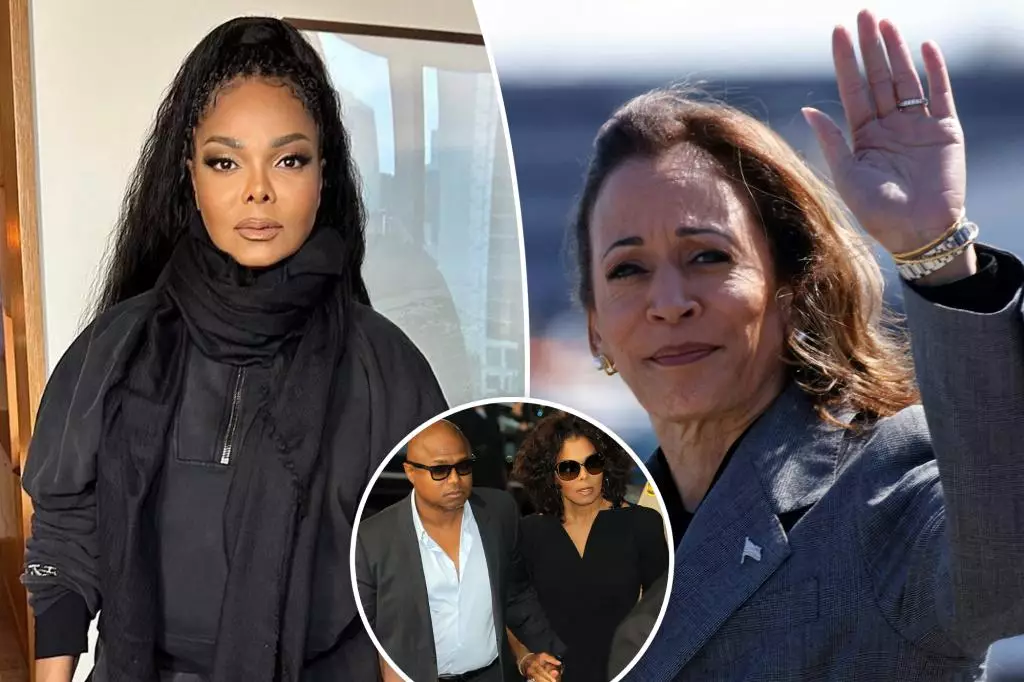Janet Jackson, a beloved icon renowned for her groundbreaking music and social activism, finds herself embroiled in controversy that raises questions about her public image and personal control. Drawing from a recent interview, wherein she made disparaging remarks about Kamala Harris, the first female and Black Vice President of the United States, Jackson’s words sparked outrage across social media platforms. Critics quickly condemned her comments, branding them as tone-deaf and inconsistent with her longstanding advocacy for marginalized communities. This incident not only threatens her reputation but also amplifies concerns among her close associates about her management and the influence of her inner circle—specifically her brother, Randy Jackson.
Behind the Scenes of a PR Crisis
The controversy began when The Guardian published an interview in which Janet, while discussing Harris’s racial identity, mistakenly claimed that Harris was not a Black woman. “That’s what I heard… that she’s Indian,” Janet said during the conversation, insisting that Harris’s racial background was misrepresented. Such a misstep is particularly jarring considering Janet’s history as a trailblazer for racial and social justice causes through her music and public persona. The backlash was swift, with public figures like comedian DL Hughley criticizing her remarks in stark terms, pointing out the irony of her questioning Harris’s race while publicly altering her own appearance.
As the public outcry grew, insiders revealed that Janet’s inner circle was perplexed by her comments. Many are worried that the repercussions could overshadow some of her previous career-defining moments, such as her infamous Super Bowl performance that famously ended in “Nipplegate.” With a history of addressing serious societal issues in her work, Janet’s remarks felt completely out of character to those who know her as a careful and methodical artist.
Of particular concern is the role of Randy Jackson in influencing Janet’s public persona and decision-making. Sources close to Janet hint that her brother’s management style—characterized as inexperienced and overly vocal—might be exacerbating her current predicament. The fallout from the interview has cast a spotlight on the dynamics within her team, leading to worries that Randy lacks the savvy to navigate the complexities of public relations in today’s media landscape.
Despite the chaos following the interview, Janet and Randy reportedly hoped to let the situation “blow over.” Meanwhile, the inconsistency from individuals claiming to represent Janet, including a man named Mo Elmasri who publicly claimed he was her manager, only added to the confusion. Elmasri’s claims were quickly dismissed by Janet’s official representatives, revealing a lack of internal coherence about who truly manages her affairs. This not only undermines Janet’s credibility but also questions the foundation of her current management structure.
Janet Jackson’s public missteps must be viewed within a larger context of fame’s isolating nature. Living in London, she reportedly has disconnected from global affairs, choosing instead to focus on her immediate circle. This self-imposed bubble may have left her out of touch with contemporary societal issues and public sentiment. Janet’s admission during the interview that her new music remains “on the shelf” raises alarm bells that she may not have the necessary urgency or clarity to navigate an evolving industry that thrives on new releases and engagement.
With the upcoming release of an unmaterialized album and plans for a Las Vegas residency, observers question whether Janet is truly ready to make that leap. In her own words, she remarked about waiting for the “opportune time,” yet associates are skeptical about the authenticity and volume of her musical output. This duality—between what her fans expect and what she’s ready to deliver—adds to the tension surrounding her current trajectory.
As Janet Jackson rides the waves of public scrutiny and personal turmoil, the issues she faces are emblematic of a broader struggle for artists navigating complex relationships between personal identity, public perception, and management. While she has built a stellar reputation as an advocate for social change through her artistry, the concern over her control—both artistically and personally—raises critical questions about the future of her career. Ultimately, it may be necessary for Janet to reassess her inner circle, regain agency in her artistic expression, and reclaim the narrative that has long defined her illustrious career. As she embarks on this journey, fans and observers alike remain hopeful that she will emerge stronger, wiser, and more resolute in her dedication to the causes she has championed for so long.

